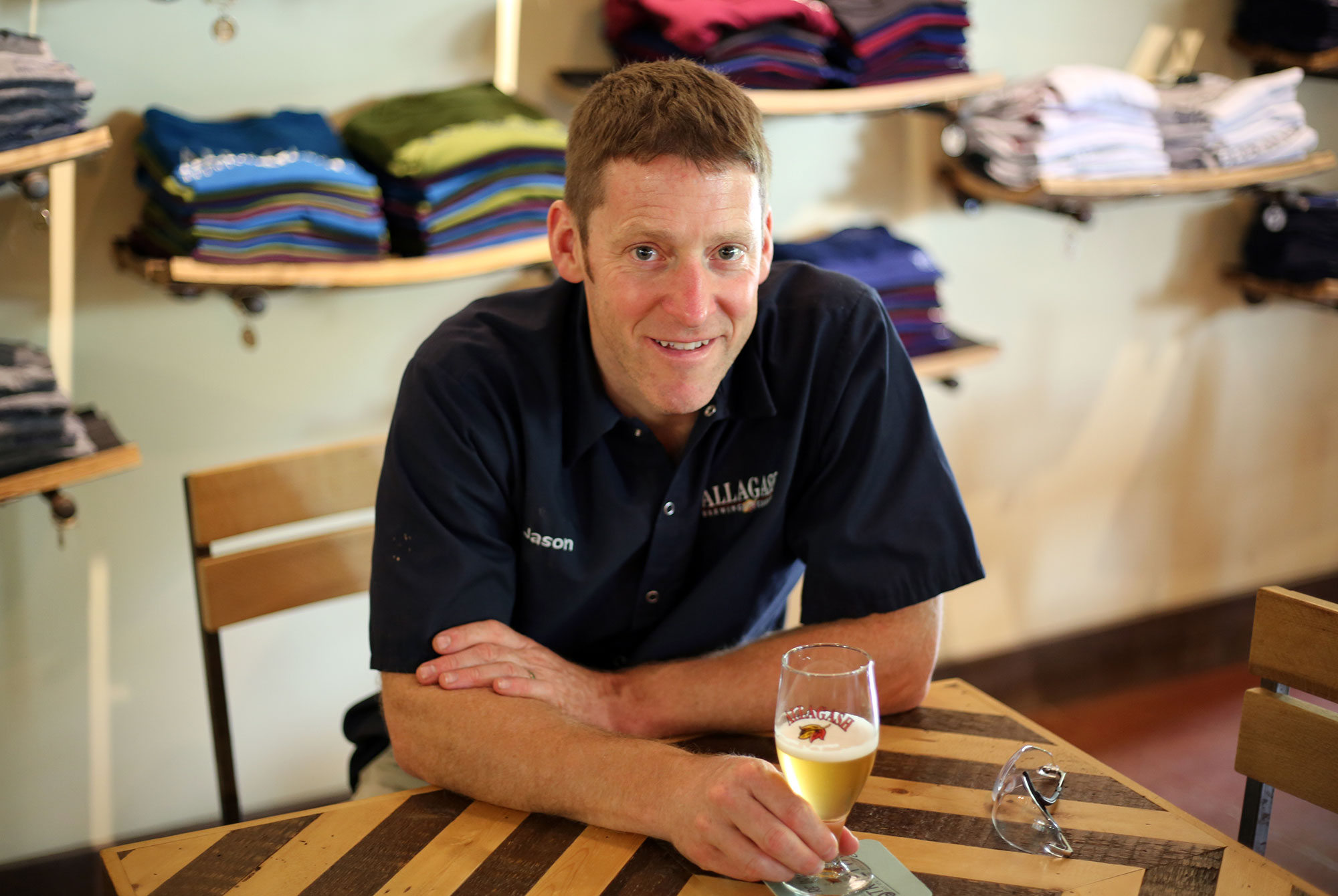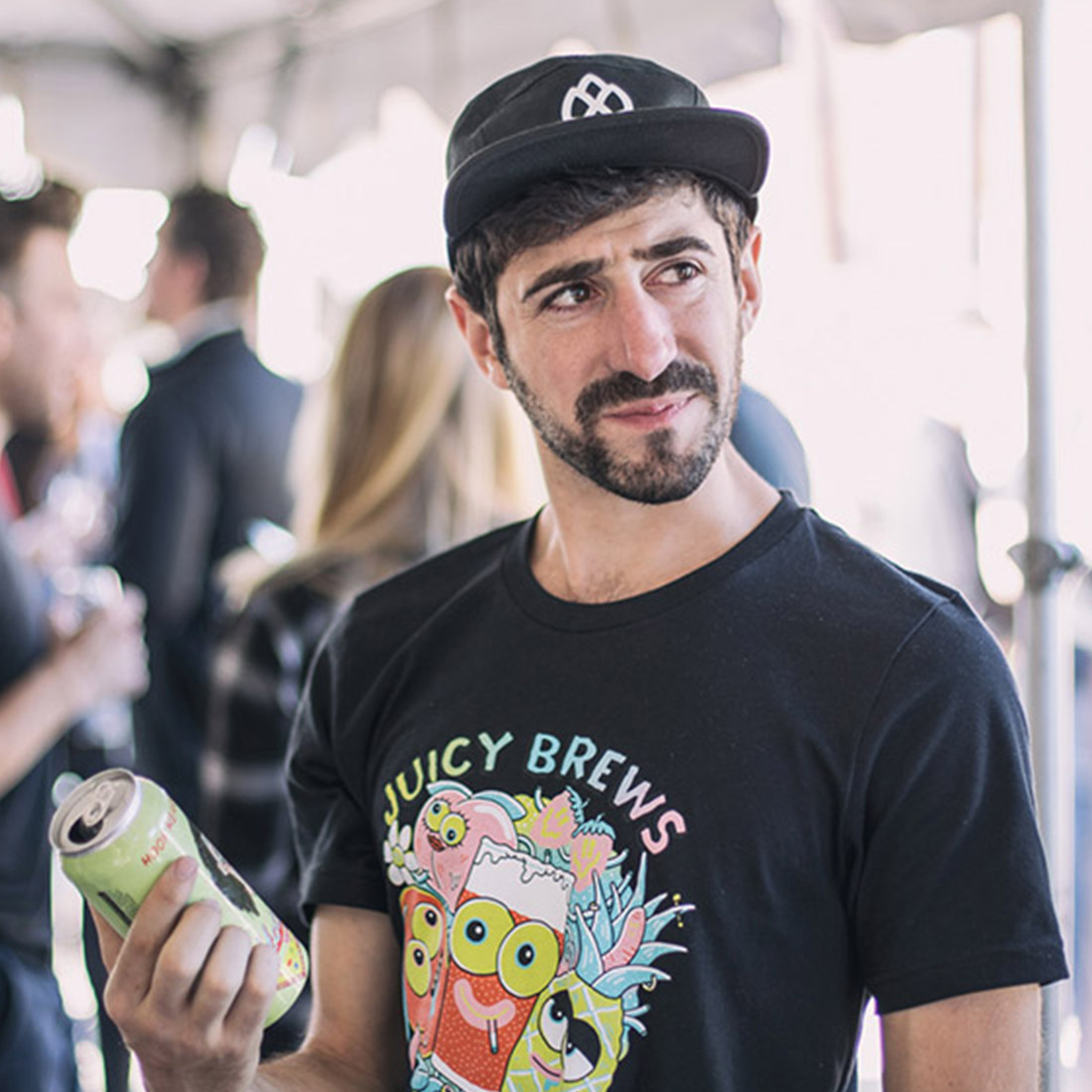Shop
A Pint with Jason Perkins
We chat with longtime Allagash brewmaster Jason Perkins about beer, barrel-aging, and Belgian tradition.
Things we learned:
- Jason Perkins got most of his jobs by literally knocking on doors
- No one person gets credited with making any of Allagash’s beers
- Craft legend Pierre Celis saved the white (witbier) from extinction
- Ale brewed with ginger and aged in gin barrels tastes damn delicious
- Often underrated, Philadelphia has one of the best craft beer scenes in the country
The United States’ craft beer scene owes a lot to Belgium: barrel-aging, the addition of spices, the selection of yeast, and the spirit of experimentation. However, despite their storied craft beer history, Belgians drink more cheap, mass-produced lagers than Americans. And new brewery growth? Practically non-existent. It only makes sense that the Belgian tradition would find a worthy successor in the world’s newest and most robust craft scene; though Portland, Maine, may not have been the average person’s first guess to find said successor. But over the course of the last 21 years, Allagash Brewing Company has established themselves as one of the greatest breweries in the country, putting out consistently delicious staples like Allagash Black and White as well as one-offs and unique barrel-aged selections that rival anything found in Europe. Longtime brewmaster and all-around nice guy Jason Perkins sat down with Hop Culture to talk beer, barrel-aging, and Belgian tradition.

Kenny Gould: How did you get here?
Jason Perkins: I grew up on a small farm in Vermont and we grew a lot of our own food, raised animals as well. Kind of that hands-on creation part of things really intrigued me. I think I just fell in love with it right from the get-go. I moved out to Montana right after graduation from Bates and I started waiting tables and doing a lot of homebrewing. I knocked on a door of a little teeny brewery called KettleHouse — which has grown a little bit, still pretty small — and I brewed with them for about a year and then I wanted to move back to Maine. I grew up in Vermont and really just wanted to be back in New England. My girlfriend — wife, now — and I moved back to Maine. First I did about a six month stint at Gritty McDuff’s, a brewpub in Freeport, and then started looking for something else, mostly because they only had part-time work for me. I knocked on the door of Allagash, which at the time was Rob and one other guy, and hit it off with them. They happened to need help at the time, so I started three days a week and shortly after started four, then five. That was January 1999.
A lot of times people will refer to a beer as a recipe; what they’re really talking about is grain, hops, and yeast. That’s certainly a very important part of the scaffold of it, but the true recipe is so much more than that.
KG: What beers does Allagash make that we have to thank you for?
JP: I always look at our beers as company beers. I certainly have my hands in all of them to some degree, but… let me get on my soapbox for a second. A lot of times people will refer to a beer as a recipe; what they’re really talking about is grain, hops, and yeast. That’s certainly a very important part of the scaffold of it, but the true recipe is so much more than that. It’s the processes and how you handle them, etc. So many of our beers are created by the group. In some ways all of them, and in some ways, none of them.
KG: If you could bring anybody on to the brew floor, dead or alive, who would it be and why? And it doesn’t have to be someone in the beer industry. Garrett Oliver chose Obama, so you can go with really anyone.
JP: I think it’d be really interesting to have Pierre Celis. He didn’t create the white beer, but really brought it back from the archives of brewing. I never personally met him, but Rob knew him fairly well before he passed away and everything I’ve heard or read about him is very intriguing. I know he was a very sharp guy with a lot of knowledge and history in his past. That’d be an interesting one, obviously, because Allagash White is a cornerstone of who we are and he’s credited with revitalizing that style.
KG: What smaller brewery is doing some interesting things right now?
JP: We’re so lucky right now that there are so, so many that are doing some fun things. I think we’re lucky that just down the street from us, Foundation is a relatively new brewery that I think is doing some great stuff. I don’t know if it’s fair to say that they’re not getting the credit they deserve—because I think they are getting credit—but we’re lucky to have those guys right down the street from us. Every time I travel I try something new that I haven’t had before.
KG: Do you have a favorite beer city other than Portland?
JP: I’d say that Philly is definitely up there, as it has such a deep culture of craft beer and a long one, too. It’d certainly be easy to say somewhere like Portland, Oregon, which is a fantastic beer city but there’s something kind of cool about Philly’s more, I don’t know, working man or raw culture. There are so many great beer bars in that town.

KG: Can you talk about this beer a little bit?
JP: This beer is our Fluxus, so it changes every year. It started as our anniversary beer when we had our tenth anniversary—eleven years ago now—so we came out with our tenth anniversary beer, which seemed like the right thing to do at the time. Then we came out with an eleventh anniversary beer the next year that was different, and then we were kind of like, “this is going to get silly… do we really want a twelfth anniversary beer and a thirteenth anniversary beer?” So instead of making a twelfth anniversary beer, we just made Fluxus instead. Every year since, it’s coincided with our anniversary—July 1st—and usually gets released sometime in June or July. It’s a totally wide open scaffold for what the beer can be. Luckily we’re making Belgian style beers here, so we have a lot of range. Every year it’s been totally different: dark, light, barrel-aged sometimes, spices sometimes, etc.
The last ten years, every one of these has come off our pilot system. Actually, a lot of our new beers come off our pilot system, but this is one of the guarantees that we have every year. Our pilot program is set up so that any employee who works here can submit a pilot idea. Sometimes it’s a brewer or someone with a bunch of homebrew experience that can build that recipe on their own; sometimes it’s someone who just has an idea and our pilot team will work with them to build a recipe. This is one of those beers from one of our employees who doesn’t work here anymore, but is still a good friend. Rachel used to work here in Guest Relations and it is a saison brewed with ginger and aged in gin barrels. It was kind of fortuitous the way the whole thing happened because Rachel had brewed her pilot beer sometime in the winter, which was close to when we were getting ready to make a decision about which one of our pilot beers we wanted to use for our Fluxus. On the small pilot scale for barrel-aging, we have a couple options: we do have a small little 10-gallon barrel we can use, but sometimes we’ll use oak spirals soaked in a spirit to try to infuse the flavors. And that’s what we had done on the pilot scale, and we were kind of scratching our heads saying, “How are we going to get gin barrels if we ever upsize?” And right around that same time frame, some folks from Caledonia Spirits knocked on our door. They’re a small distillery in Northern Vermont. And they said, “Would you guys ever want to do anything with us? We’ve got these used gin barrels.” It was very fortunate. So we were able to get the gin barrels from them. We actually went up and toured their facility; they’re real small, but making some unique spirits up there made with honey.
KG: You’re a Belgian-inspired brewery here in the US. What is the scene like in Belgium and how is that reflected here? Do they have a better culture that we’re trying to move toward?
JP: It’s kind of a yes and no answer because they have a very deep beer culture over there. There’s no country I’ve been to that has the history… well, Germany does, but there’s a little more reverence for beer in Belgium than even Germany. You order a beer in almost any location in Belgium and you will get it in the exact proper glass poured with a perfect head with the label facing you when they serve it to you. There’s a lot of small family breweries, a lot of historic multi-generational breweries, a ton of creativity at those breweries. One of the things that I think defines Belgian-style beers is the lack of style and style parameters. There’s whites and dubbels and tripels but then there are these “specialty” beers that can fit in a lot of different categories.
Interestingly enough, the other side of that coin is that the majority of people over there still drink mass-produced, cheap lager—even more so than they do in the US. If you go over there and just walk into a random bar without guidance, you’re going to find a generic draft list. If you know where to go, you find this wonderful range of beer styles and beers. On the one hand it’s got this history and reverence, but in other ways it’s behind the US. The growth of breweries over there is so much lower than it is here.
I think the US craft brewing movement currently draws a lot of inspiration from Belgian tradition and there’s a huge degree of ignoring style parameters in the US, or at least expanding existing ones, and I think a lot of that inspiration and creativity is drawn from Belgian tradition. Barrel aging, spices, yeast selection… those are all things that I think come from Belgian tradition that are now being used all over the place.
KG: Where is the industry headed? What do we have to look forward to? What’s coming?
JP: More and more consumers will be turned on to what’s being offered out there, and what’s being offered in the craft beer world is a range of new flavors and new experiences. I think people will always want that. But there’s a lot, a lot of breweries out there, and there are a lot of breweries expanding. At some point, there won’t be the same growth that exists right now. Two years ago, almost anyone who wanted to could grow. I don’t think that’s going to be the case anymore. But that could end up being good for the industry. I think the overall quality that’s out there right now is good, but it could be better. I think there are some headwinds coming for people but in the end I think it’ll be good for the industry and good for the consumer.
KG: Thank you for your time.




